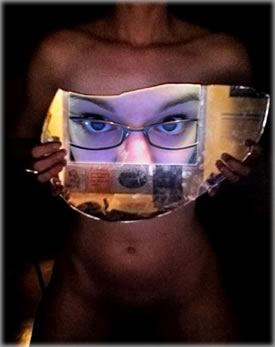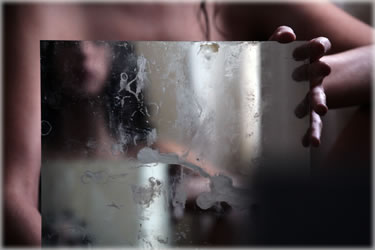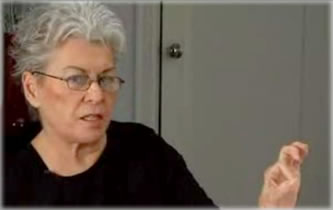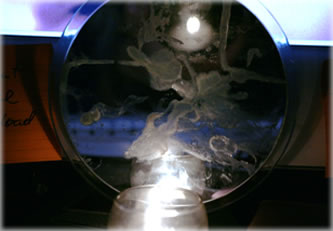
| Feb. 25, 2008 Introduction | Part One | Part Two | Part Three | Part Four | Part Six | Horoscope | Link to This Subscribe to this series. Before the Beginning
Masturbation and the 12th House of Astrology By Eric Francis THE 12th HOUSE is usually considered the house of unconscious patterns: the things we do but don't understand, our hidden psychological legacy, and deep influences that are missing from view or are unidentified. The 12th represents our relationship to things that are unknown, or which we think of as unknowable, for example, memories of what it was like to be a fetus. It's often considered the most difficult house to understand, but in a way it holds the key to human psychology. It has distinct properties, and once you learn to look for them, they are easy to spot.
For example, the 12th is the house of dreams and fantasies. We all have this hidden ocean of them, and every now and then we dip in. These scenes can seem meaningful and necessary while we're in the midst of them; we might have familiar places we visit in our dreams but cannot even think of any other time. Or imagine if your sequence of thoughts in the last 10 seconds before you gave yourself an orgasm this morning were sent out as a memo to everyone in your company. What we call the ego -- the front end of the human mental operating system -- politely filters that stuff out. Then, occasionally, it comes bursting through in the form of a very intense dream or taboo experience. Not everything in the 12th house is accounted for; that is the nature of a hidden influence. Humanity walks around on top of a slagheap of ancient ideas, emotional responses to historical events passed down the generations, and all the stuff that comes along with our genes and chromosomes. Most of these things don't have names. When you think of the profound influence that the experiences or thoughts of one ancestor whose name we don't know can have on our lives, we might want to notice the process at work. For example, imagine if a female ancestor had an extremely negative experience with a man as a teenager that caused her to hate men. She had a daughter and passed along that feeling, focusing it on the age she was when it happened; that woman in turn had a daughter and did the same thing and, two generations later, you picked up the influence at nearly full strength. But you had no access to its source or even evidence of its existence. It was passed to you as an unconscious program buried in your mother's emotional pattern, which she got from her mother's ancestors -- and today, it could be running your life. Even if you noticed that, you might not take too kindly to it, and here is where the denial factor of the 12th comes in handy. We can just pull the curtain and whatever we observed is back in its own dimension, behind the veil. Notably, in traditional astrology, the 12th is considered the house of prisons. This seems like an externalization of the idea that this place in our minds is either an internal prison where we are locked into a world of our deepest fears, feelings and secret needs; where we are trapped in a prison of illusions; or where we are locked outside of a place that is the inner sanctum of spiritual awareness. And like the old joke about why there are walls around cemeteries, I believe that people are dying to get in. Metaprogramming and the 12th House In the 1950s and 1960s, someone named John C. Lilly developed the concept of a metaprogram in human consciousness. Metaprograms are scripts in our minds that basically run the show. They include all the information that comes along with our DNA, plus cultural patterns that humanity has adopted over the millennia. Many of these have distinct expressions in individuals, but we don't usually see them; we don't usually notice the phenomenon; and when we do, it can seem too huge to grasp (a characteristic of the 12th house). These metaprograms are essentially immortal, due to the nature of how memory is passed down the generations via our DNA, though if we take over the process, we can rewrite them.
The term metaprogram has since been picked up by computer engineers to describe programs that create or manipulate other programs. This is a reasonable description of the process in people, only unlike most computers, we have the ability to become aware of what is going on, and if we want, to do something about it. We can notice our metaprograms at work, and we can rewrite them if we want. We can access and use our own biocomputers. (Astrology is one way to do this, more or less scientifically.) Lilly had no illusions about how challenging the process is to observe, and how difficult it would be to sort out the genetic metaprograms from the ones given to us by, for example, school teachers. He wrote, "This is an immensely difficult area of research. It requires that many talented individuals consider their own thinking process, combined with a detailed knowledge of their genetic structure and their genetic predecessors." Rather than take sides on the sources of these influences, he said, "I would prefer to see talented individuals with large mental capacities investigate their own minds to their very depths." Think of the 12th house as a vast psychic computer that contains all of this programming. While the other 11 houses are usually experienced directly as environments, as modes of thought or expression, or as interaction with others, the 12th hums along in the background -- a chorus of species knowledge, biological instructions, early experiences that are still talking to us, and the unconscious level of the mind, occasionally perking to the surface of thought. We experience it like a parallel universe where none of the usual rules of the world apply. Sometimes when information emerges deep from within this pool -- a profound dream, for example -- it can change us irrevocably. Sometimes we dip in voluntarily, and touch a raging hot erotic fantasy that we like to get off to. In Vedic astrology, the 12th is considered the house of the pleasures of the bed -- the place where we make our fantasies real -- though we might never discuss what happens there. This parallel universe feeling of the 12th is one of its most distinctive properties. It is so dualistic that we might not even be aware that the other side of reality exists. When we are inside the 12th, only it seems real. When we step outside, it seems impossible, strange or embarrassing. Or, we are barely aware of it at all. Imagine waking up to one of those really intense dreams, one that seems incredibly real and vivid with profound implications. Within the first minutes after waking up, it starts to fade. The forebrain takes over and starts to apply rational thinking. All through the day, the dream is lurking as if in a distant room. We might be only dimly aware of the feeling or imagery, or forget entirely; then it wafts into awareness "out of nowhere," and just as quickly dips down. Yet all through the day, the dream is influencing our emotions silently. That is one of the most distinct feelings of the 12th house. You are here; it is there; it is inside you but somehow apart from you. Occasionally we allow it into awareness, or it seems to force itself there. It's not logical. The 12th defies rational logic or shall we say, it possesses its own internal logic. If we remember this property, we can slowly begin to make contact with our metaprograms; we can recognize them when we see them. Occasionally, a historian digs one of them up and we get a look at it in plain text format. Onania and the Metaprogram of John Marten On two different accounts, I would assign masturbation to the 12th house of astrology. In the past I've assigned it to the 2nd house (personal resources and self-esteem), and I would say those ideas still apply. Yet there is much to the experience of masturbation that occurs only in our secret fantasies and dreams that has nothing to do with the 2nd. With masturbation, we seem to be on one side of the membrane or the other -- we are deep in that space of melting down into boundaryless sexuality, or we are in our rational mind and all those strange things we were thinking, feeling and doing are not something that we can deal with. Remember the 12th when you encounter this kind of dualism; this sense of a difficult to discern locked room within a room.
Here is what Wikipedia writes about the setting: "Until the early 1800s, Grub Street was the name of a street in London's impoverished Moorfields district. In the 1700s and 1800s, the street was famous for its concentration of mediocre, impoverished 'hack writers', aspiring poets, and low-end publishers and booksellers, who existed on the margins of the journalistic and literary scene. Grub Street's bohemian, impoverished literary scene was set amidst the poor neighborhood's low-rent flophouses, brothels, and coffeehouses." Until this time, masturbation was not an issue. In a sense, Marten wrote an infomercial and invented the modern concept of masturbation that impacts us to this day: something shameful and with serious, even grave, consequences. This history has been researched and carefully documented by Thomas Lacquer, a professor at UC-Berkeley, in a book called Solitary Sex: A Cultural History of Masturbation. Before and after Onania, Lacquer writes, masturbation is two entirely different things. Before Onania, that is, dating back thousands of years to classical antiquity, it hardly warrants mention in medical, philosophical or moral writings. In a sense, it does not exist in the clearly defined way that it does today. It is usually ignored entirely, at best considered a kind of joke, and at its worst was either part of the larger sin of lust; or the sexual domain of losers who could not afford to hire a hooker or use a slave to have sex with. Masturbation is not mentioned in the Bible. (Onan, a biblical figure, was not a masturbator -- he practiced the kind of birth control which today we call pulling out. His theft of Onan is a kind of fraudulent appeal to old-time authority.) After Onania, masturbation threatens to destroy individual lives through the "trouble and agony of a wounded conscience," undermine the order of society and if you extend the logic to its apex, to end civilization. Within a few decades after its publication, Onania had become accepted sage wisdom, making its way from Grub Street to the learned drawing rooms of European high society. According to Lacquer, none other than Immanuel Kant, the stoic philosopher who gave us Critique of Pure Reason, had adopted its ideas. It is clear to "everyone, immediately," Kant wrote, that masturbation is "contrary to morality in the highest degree." Kant felt that it was so repugnant that "we consider it indecent even to call it by its proper name."
So, one guy -- John Marten of Grub Street, London, some time around 1712 -- wrote a metaprogram that humanity has been dragging around for nearly 300 years. He created an entire industry of cures for this new "disease" of masturbation. The message of his book was picked up again and again, reiterated by imitators, exported across Europe, eventually finding its way into medical colleges, theology classes and high philosophy. It was shipped across the ocean to the colonies, and basically was repeated until it had become a truth older than the Great Sphinx. But it is not so very old. Lacquer's search of world literature, including ancient Greek texts, the writings of Talmudic scholars and the Parchment Scrolls of Sesame Street, is so exhaustive as to be a bit tedious. But, says Lacquer, you can search every index and mythological reference, and no such concept of masturbation's moral torpiude exists before Onania. Today, we think we have different ideas about masturbation and to some apparently growing extent, some of us do. The 12th house does not change overnight or in a century; it may take a person half a lifetime to sort out these influences within themselves, which could add up to generations. The influences of the 12th house exist despite the ideas and activities of the other 11 houses. Remember -- even if we have a clue what is going on, the 12th is easy to deny; denial is its hallmark. It is the house of influences too pervasive to see. It is the house of metaprograms that run all the other programs in our consciousness from generation to generation. And some funny tricks happen there. Linear time and reasoning are gone, and one can manifest in a world of quantum changes, or of possibilities that stretch to fit our honest needs. Masturbation as Primal Sexuality Masturbation is the primal core of sexuality. This is intuitive enough. In other words, masturbation and all of the fantasies and feelings involved exists at the core of one's sexual existence, and everything else is an extension of it. How we feel about masturbation is the metaprogram that runs the rest of our sexuality. It's generally the first sex we experience, the most frequent, and the one most deeply connected with our secret or unspeakable needs and desires. It is also enmeshed with our innermost feelings about ourselves, and about our existence. Many say that self-given orgasm takes them somewhere they can go no other way; numerous women cannot experience orgasm any way other than masturbation.
Our concept of masturbation, as handed down through Onania*, is that it is evil and immoral -- as is lust or desire; and by extension, sexual feeling of any kind. The extreme guilt that so many people associate with masturbation is specifically part of that metaprogram -- the "trouble and agony of a wounded conscience," in Marten's words. If one has a troubled conscience about masturbation, can they really feel good about the sex that they share with others? If you ate rotten food, would you want to have someone else over for dinner? It may be difficult to accept that we were taught to be this way; it seems so "natural." For some who feel that sex is perfectly natural, it may be difficult to accept that we are indeed this way at all. Yet if you want an easy litmus test, write out a recent experience of masturbation, in full detail with the fantasies included, and consider who you could actually send it to. Could you send it to anyone at all? Well, if masturbation is so natural, why not? I am here to propose that our experience of masturbation is so deep as to be existential, that is, not only does it determine or influence how we feel about sex, it colors, influences, and maybe even runs many other programs about how it feels to be alive; to be an individual; to make choices; to experience the pleasure of existence; and to consciously decide when to let go. And from what I have witnessed and dragged myself through on this planet, the pleasure of existence is something that we could use a lot more of. The timing of Onania was not merely coincidental. The book emerged at the dawn of what was later called The Age of Enlightenment. This was a metaprogram being created at the time when science (reason) was beginning to take over where religion left off, granting human beings more freedom from authority, and introducing the idea of self-determination. Our lives were not merely predetermined, we did not have to be bossed around by God, and through reason and scientific knowledge, we could know something about the truth objectively. In his history of masturbation, Lacquer describes the ideas in Onania, and all their pedigrees, as the shadow material of the Enlightenment. In other words, when individuality and self-awareness were first being born as tangible concepts, masturbation came to represent the worst fears of an individual not needing other people; it represented a shadowy fear of being totally self-reliant. The enlightenment promised freedom, individual rights and the power of individual choice; masturbation was feared like this monster that could make us "too free." From there, it is not a long leap to the possibility self-given sexual pleasure, which is theoretically available in infinite abundance, could undermine the entire social order -- such as marriage and therefore the role of women, the structure of the family, and all the economic institutions, laws and customs that are supported by relationships that are based on dependency, property rights and ownership of another person. To some extent that dependency is social, and to some extent it is economic; but very often, it is hooked into sex. Sex with oneself having been corrupted, shut down, and the self ultimately turned against itself, we must necessarily seek others to fill in the empty places, and to assuage the core shame of primal sexuality -- masturbation. We seek one another to relieve the shame of existence, and to a real extent, the shame of existence was formalized, crystallized and conveyed as anything from reluctance to disgust with masturbation.
Alfred Kinsey at least delivered the happy but not so shocking news that most people masturbate. Basically, he said that it is normal. That was a very big help. Few people seem to get how close to the core of sexuality or existence it resides. The history of masturbation after Onania is the history of psychological abuse committed on the human race. Taking away its most independent pleasure and casting it into hell; instilling profound misgivings about the most democratic form of sex; corrupting the experience that could help us weave an emotional biofield that is not specifically dependent upon another person. These represent what may be the most powerful metaprogram humming along in the background of our minds, and collectively. Certainly, our dependency-based model of sex is not working so well. For one thing, it gives people extraordinary power over one another. If you believe that violence is what happens when you repress sexual energy, in particular male sexual energy, connect the dots.. And when you suppress self-awareness and selflove, when you make them things worthy of guilt and shame, they emerge in toxic ways: you end up with a narcissistic society that is obsessed with image and self-image where by some consensus vote that I don't remember being part of, it was decided that one's own truth could never be known. All of these are the result of something that could be entirely positive but which is turned against us. Another Scenario or Two The world did not see much commentary that was positive about masturbation until someone named Betty Dodson emerged on the New York art scene in the early 1970s. Betty emerged with her full-color portraits of cunts, her women's bodysex groups (essentially group masturbation sessions) and a book called Liberating Masturbation. More than two and a half centuries after Onania, someone finally bothered to write a metaprogram which proposed that masturbation is beautiful and natural; let's do it freely, and do it together and emancipate ourselves from our sexual hang-ups.
I was talking to Betty yesterday and proposed how it might have been had she lived in the early 1700s and written her book then. Imagine if the set of ideas we were given about masturbation, and hence about sexuality, at the dawn of the Age of Reason, affirmed life and self-given pleasure instead of attacking them. "It would be a whole different world," she said. It's possible to imagine the ways. Consider the kinds of relationship that could have emerged if people existed in a state of inner sexual harmony and possessed a real measure of erotic self-sufficiency. Imagine if sexual desperation did not exist. Imagine if we were all adequately self-possessed that possessive forms of relationship did not have any appeal. Imagine a world where people were not turned against themselves on this most intimate level of awareness and feeling. We might live in a world that offered many options for how to relate to one another, instead of a one-size-fits-all model of love. It would make sense to have many options for love, because it would be obvious that we are all individuals. I believe that every individual has a unique sexual orientation. Maybe this would be respected. We would probably not feel the intense pressure to constantly find our identity in a sexual relationship. We would believe it was possible to find it some other way. If our core sexual consciousness were not tainted with guilt, we would be able to extend our love and our sexual awareness in a way that was clear and free of guilt. Yet consider the possibilities a few shades beyond. Imagine if self-given orgasm were the portal to full inner consciousness. Imagine if, through a program of training precisely opposite that of Onania, we were taught that self-given orgasm is a path to integrating our identity, freeing ourselves of ego consciousness and embracing a dimension of spiritual existence that was born of true self-knowledge. This is a hypothesis. I have not proven it; but I am curious. Consider the possibility that the deep, solitary world of personal orgasm contains freedom from our ideas about death, and the fear of death, and puts us in contact with direct experience of divine awareness. Imagine what could be, if we were to understand, refine and cultivate masturbation as a kind of yoga of consciousness, and create a culture or community where we support one another in this degree of self-awareness. We might be able to go through many inner doors to self-realization, be whole people, and relate to one another as such.
I recognize that it's difficult for most people to think of masturbation, you know, whacking off, as having this kind of potential. However, if you don't see the potential, maybe it's because you have ideas that are blocking the awareness. A multitude of them certainly exist. The biocomputer you are using is only as good as the metaprograms it is running. Onania was, in a sense, a work of genius because of its ability to close us off to this very level of being -- to what is in truth a metaphysical dimension that many people seem to fear deeply; but that, too, is based on a set of instructions. To plunge into this deeply negative programming and begin to unravel it takes courage. To consciously challenge any cultural programming takes guts, devotion and creativity. To seek something different, a world based on pleasure, sharing and understanding, takes even more courage. Usually, such a journey requires help and it takes some resources, in particular, different ideas than the ones we were taught and a means of deciding what is really true for us. And I don't think we are going to do it alone. The most important ingredient is something that anyone can call upon and receive: the desire to connect with oneself, and then with those around us. * I read a review of Thomas Lacquer's book today in The Journal of Sex Research. The review noted that Onania, rather than being an original work, was really a kind of compilation of ideas already circulating at the time. That was my first impression of the literature when I saw an actual chapter from Onania about 15 years ago. This would seem to blow Lacquer's theory that one author, John Marten, and his one book, Onania, were responsible for all of our negative programming about masturbation. I am not sure it matters that much. We have Marten to thank, at the least, for coming along and writing a kind of Gospel According to John that was passed down through the centuries. All the lasting voices are "the ones that came from you and me," in the words of American Pie. What would have been different if not for our faithful scribe is that the whole ideology might not have been etched in Guttenberg stone, and might have began to evaporate sooner than it did. |







